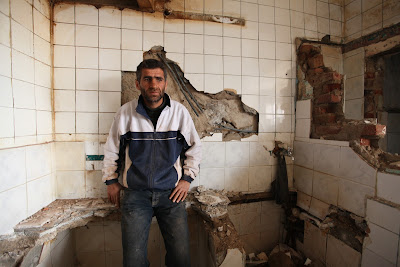I have a piece out on Eurasianet about the demolition of a shanty neighbourhood (‘gecekondu’) in Izmir.
This is a largely untold scandal in Turkey’s big cities, where authorities are knocking down poor neighbourhoods that lie on valuable land before redeveloping them, reaping big profits, and driving the former inhabitants further towards the fringes of the city – and further into poverty.
You can read it here, along with pictures by Jonathan Lewis.
I’m also posting a few of my own pictures from the visit.
The city of Izmir viewed from Kadifekale, which lies on a central hill around the old castle. Its residents believe they are being evicted because of their neighbourhood’s prime position, with a panorama of the city and cool breezes in the summer. “It’s ironic that the rich people live down in the heat, while the poor people are up here,” said one Izmiri student.
Around 1,400 of the 2,000 homes marked for demolition have now been reduced to rubble. The area was settled from the 1960s onwards, mainly by Kurds from Mardin fleeing war and poverty in the east. They recreated their communities here, earning the area the nickname ‘Little Mardin’. They have now been given little choice but to accept farcically small payments in exchange for their homes. Many now face an uncertain future.
Fatma Yildiz stands outside what remains of the four storey house her father built 25 years ago. The mother-of-five and her family were paid 40,000TL (£16,000/$24,000) for the building. It isn’t nearly enough to purchase one of the smaller apartments set aside for former residents in a new complex further away. Because of the size of her family they can find nowhere to rent, and so remain in the surviving basement floor of their home, without water or electricity, as the neighbourhood is pulled down around them.

Ahmet Bulut stands in what used to be his coffee house, a business to which he devoted 15 years, and that he has now been forced to give up – along with the two apartments he owned above it – in exchange for 40,000TL. Supplementing this with his savings he was able to buy an apartment in the new complex, but his livelihood has been destroyed. “You are seeing the condition of the Kurdish people,” he said. Many Kadifekale’s residents believe they are being targeted because of their ethnicity.
In the daytime Kadifekale is abuzz with activity as bulldozers shift rubble and former residents work in gangs salvaging anything of value from the ruins. Children as young as eight doggedly swing sledgehammers to beat the metal caging from lumps of reinforced concrete. Many of them seem so intent in their work it is easy to forget that this is a community that may face obliteration.
Once owners have emptied their homes, the houses are ‘sold’ for a small sum to teams who are scrupulous in stripping away what is left. Switches, electric wiring, door frames – all are reused.
In the evening, when the workmen go home, Kadifekale becomes a more melancholy place. Children remain playing in the ruins, and some carry on hammering out scrap metal. “It is a bitter thing to be making our living from the destruction of our own community,” says Ahmet Bulut.
